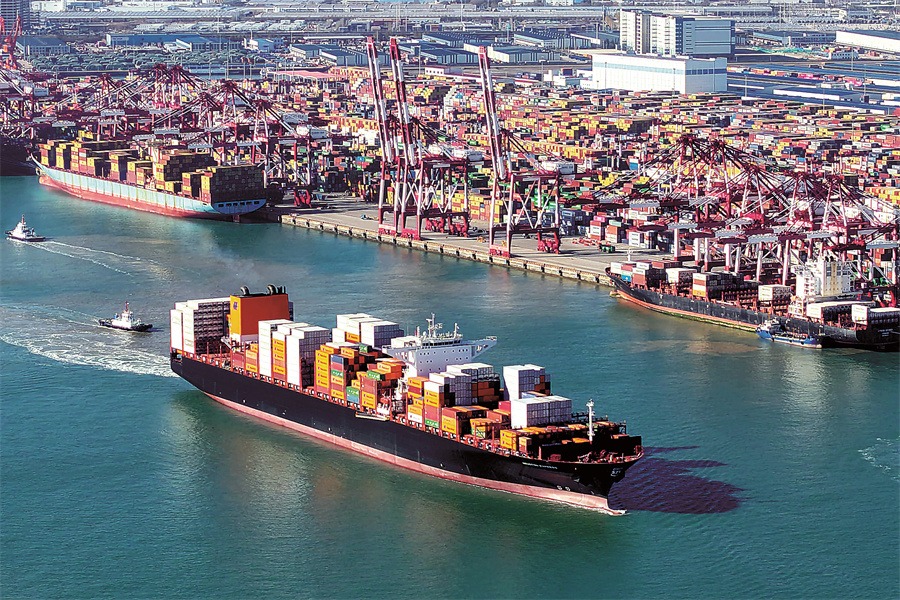Shadow over Asia-Pacific


NATO's insidious stretch into the region bodes gloomy regional security and cooperation
On Sept 7, the representatives of the four Asia-Pacific partners of North Atlantic Treaty Organization, namely Japan, Australia, New Zealand and the Republic of Korea, held a meeting on the margins of the 2022 Seoul Defense Dialogue. The meeting was a follow-up to the quadripartite summit of Asia-Pacific partner countries during the NATO summit in June 2022. The meeting was a signal that NATO is expanding its footprint to the Asia-Pacific region, which has profound implications for regional security. Since the start of the Russia-Ukraine conflict in February 2022, NATO has expressed its ill intentions to counter China's international presence and influence. Its pivot to the Asia-Pacific region heralds heightened tensions and confrontation.
First, NATO's pivot to the Asia-Pacific region will intensify the China-US competition. Due to its relative decline and strategic anxiety, the United States is seeking to take advantage of its alliance resources to undermine China's comprehensive strength and global influence in an attempt to re-tilt the balance of power in favor of itself. The US has already revived and upgraded the Quadrilateral Security Dialogue with Japan, Australia, and India to build it into a full-fledged security mechanism. The security cooperation among the Quad members and the Quad itself aim to exclude China. Besides the Quad, the US is also cajoling other allies to suppress China. The Joe Biden administration has established AUKUS, a trilateral security partnership of the US, the United Kingdom and Australia. As the largest military organization in the world, NATO's involvement in China-US rivalry could escalate the arms and space races initiated by the US, with competition exacerbated in cyber and maritime domains, key technological and industrial sectors, critical infrastructure, and strategic materials and supply chains.
Second, NATO's pivot to the Asia-Pacific region may pit China-US rivalry into camp confrontation. The US-led NATO has accused China of stepping up military cooperation with Russia, claiming that China has lined up with Russia in the Russia-Ukraine conflict in an attempt to undercut the "rules-based international order". Following their near retreat from the Asia-Pacific region after decolonization, NATO's major European members, namely the UK, France, Germany and the Netherlands, have renewed their interest in the "Indo-Pacific" by sending their warships thousands of kilometers from home to the Western Pacific to join the military exercises with the US, Japan and Australia. The continued naval deployments of the US' European allies in the region will worsen China-European relations. And despite their cooperative relations with China in trade and investment, European countries have followed the US in interfering in the Hong Kong and Xinjiang affairs, and hyping up fabricated claims of human rights abuses by China. NATO's pivot to the Asia-Pacific region will also enhance the US' existing partnerships with its Asian allies, especially Japan, in terms of pursuing cooperation in various areas such as deterring cyberattacks and diversifying supply chains. Given Japan's relations with China, such cooperation will be adverse to China.
Third, NATO's pivot to the Asia-Pacific region could go beyond security. The competition conducted by the US against China has already spoiled the atmosphere of regional cooperation, as regional and subregional economic cooperation have been slowing down. NATO's pivot to the Asia-Pacific region could accelerate the process of decoupling from China as seen in the US-initiated "Indo-Pacific Economic Framework for Prosperity", a new economic bloc consisting of about a dozen Asia-Pacific nations with the notable exclusion of China. In addition to military confrontation and ideological conflict, NATO's disruptive moves will probably fray regional economic interdependence, in a bid to pull regional cooperation back to exclusive Western economic cooperation.
Fourth, NATO's pivot to the Asia-Pacific region will add fuel to the tensions arising from the unresolved Taiwan question, the territorial disputes in the South China Sea and the Korean Peninsula issues. While NATO stands with the ROK on denuclearization of the peninsula, the cooperation between the two in cyberspace and other security domains will complicate the situation. On the South China Sea disputes, the presence of the US and NATO members will turn the sea of peace into a sea of great power rivalry dominated by warships. Also, NATO will try to obstruct China's reunification as its military support for the Taiwan authority will exacerbate the instability across the Taiwan Straits.
But it is worth noting that NATO remains focused on Euro-Atlantic security in a broad sense. Furthermore, differences still exist between NATO members on how to deal with China.
The region needs to be vigilant in regard to NATO's move toward the Asia-Pacific, as NATO has fabricated China as a systemic challenge. The purpose of NATO's pivot to the Asia-Pacific region is clear: to undermine China's development and to exert international influence. Facing China's rise, NATO countries are anxious to keep their vested interests and unfair international rules.
Regarding the challenges posed by NATO's pivot, China should keep patient while adapting to the new circumstances.
First, China needs to strengthen its capability of safeguarding peace and security. China needs to sharpen its edge against NATO's military machine. If its interests are challenged, it can make a firm response. Nonetheless, China should beware of not plunging into the trap of an arms race.
Second, China could use the policy tools available to reduce tensions and confrontations. China and the US share the major responsibility of de-escalating competition. China should strive to promote peace and development along with neighboring partners, and find ways to avoid the camp confrontation being reenacted in the Asia-Pacific region. China still needs to make efforts for inclusive regional cooperation by providing public goods, weaving the network of cooperation with regional countries, and reinforcing the cooperative atmosphere in the region.
Third, China needs to improve its ability to develop and implement a sound crisis management system. Through assessing the latest developments in regional hotspots, China can take necessary measures, including setting up more channels and mechanisms to communicate with the US, avoiding the risks of miscalculation with unintended consequences while ensuring that China's core interests are safeguarded.
The author is a senior fellow at the China Institute of Contemporary International Relations. The author contributed this article to China Watch, a think tank powered by China Daily. The views do not necessarily reflect those of China Daily.
Contact the editor at editor@chinawatch.cn


































